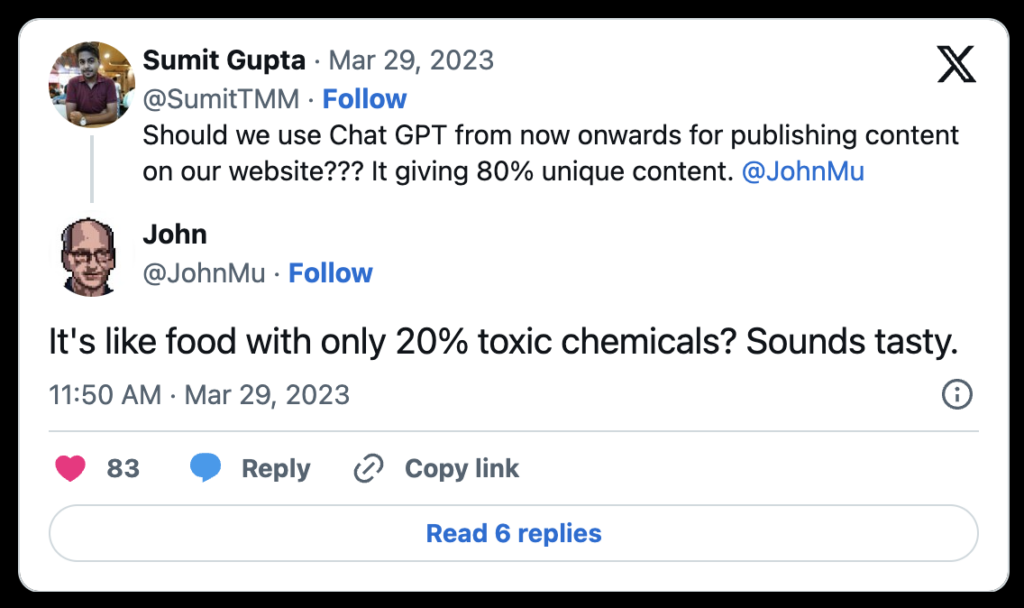In the rapidly evolving landscape of digital content creation, artificial intelligence (AI) has become a pivotal tool for many SEO writers and SEO experts. However, a lingering question remains: Can using AI content get you penalized by Google? To address this, it’s crucial to look beyond the tool itself and focus on what Google prioritizes most—quality and depth in content.
It’s Not Just About AI Content
When discussing the potential for AI-generated content to impact your search engine rankings, it’s imperative to understand that Google’s algorithms are agnostic to the means of content creation.
Whether a piece is penned by a human or generated by AI, the platform’s primary concern is the content’s quality, relevance, and value to the user. Low-quality content—characterized by poor readability, lack of depth, superficiality, or failure to address user intent—can indeed result in a demotion within search results. This isn’t a punitive measure against AI per se but a reflection of Google’s overarching principle to prioritize content that enriches the user’s online experience.
Google’s sophisticated algorithms have evolved to discern the value and utility of content, assessing factors like engagement, comprehension, and uniqueness. These criteria are met not through the source of content creation but through its substance.
Therefore, the focus for creators should be on producing content that not only ranks well but genuinely serves the audience’s needs. This approach aligns with Google’s mission to organize the world’s information and make it universally accessible and useful, rewarding content that stands out for its quality and contribution to knowledge.
What Google Says (John Mueller Specifically)
John Mueller, a Senior Webmaster Trends Analyst at Google, has offered insights that shed light on how Google views AI-generated content. Mueller has emphasized that Google’s primary concern isn’t whether content is generated by AI but whether it provides value and satisfies search intent. In various forums and discussions, Mueller has reiterated that the quality of content is paramount, and Google’s guidelines on content quality apply universally—regardless of how the content is produced.
Mueller has also highlighted the importance of originality and expertise in content creation. Google’s algorithms are designed to favor content that demonstrates a high level of expertise, authoritativeness, and trustworthiness (E-A-T).

In response to queries about AI-generated content, Mueller has suggested that creators should focus on ensuring their content meets Google’s quality standards. He advises content creators to review Google’s Webmaster Guidelines and ensure their content aligns with the principles outlined there. The underlying message from Mueller and Google at large is clear: the path to success in search rankings is paved with content that genuinely serves users, offering them insightful, accurate, and valuable information.
Writing for the User
The key to success in the realm of digital content, AI-generated or not, is to always write with the user’s needs in mind. Content that resonates with readers, answers their questions, and offers unique insights has a greater chance of performing well. Google’s sophisticated algorithms are adept at identifying content that fulfills these criteria, promoting it in search rankings as a result.
Offering Unique Information
One of the best strategies to avoid any negative impact on your SEO efforts is to ensure your content offers something new. This doesn’t necessarily mean every piece of information has to be groundbreaking. However, presenting information in a unique way, offering fresh perspectives on well-trodden topics, or delving deeper into subjects than existing content does can set your work apart. Google values content that adds to the web’s collective knowledge base, rewarding it with better visibility.
AI as a Tool, Not a Crutch
It’s essential to view AI as what it truly is—a tool in the content creator’s arsenal. Like any tool, its effectiveness depends on how it’s used. AI can assist in generating ideas, providing initial drafts, or even suggesting improvements to existing content. However, the onus is on the content creator to refine this output, ensuring it meets the high standards of quality and uniqueness that Google—and, by extension, your audience—expects.
Staying Ahead of the Curve
To stay ahead in Google’s search rankings, it’s not enough to simply avoid penalties. Content creators must strive to understand their audience deeply, crafting content that addresses their needs, answers their questions, and enriches their understanding of a topic. In this context, AI can be an invaluable ally, but it cannot replace the insight, creativity, and expertise of a skilled content creator. However, recovering from penalties or navigating Google’s core updates can be challenging, particularly with the Helpful Content Update. Therefore, it is crucial to make the appropriate adjustments using AI-driven content strategies.
Conclusion
In conclusion, AI-generated content does not inherently risk Google penalties, but low-quality content does. The focus should always be on creating high-quality, user-centric content, regardless of the SEO tools used in its creation. By leveraging AI responsibly and prioritizing the depth and uniqueness of the content, creators can harness the power of AI without compromising their standing in Google’s search results. Remember, in the digital age, content is not just king—it’s the kingdom itself, and how you build that kingdom determines your success.

Be First to Comment